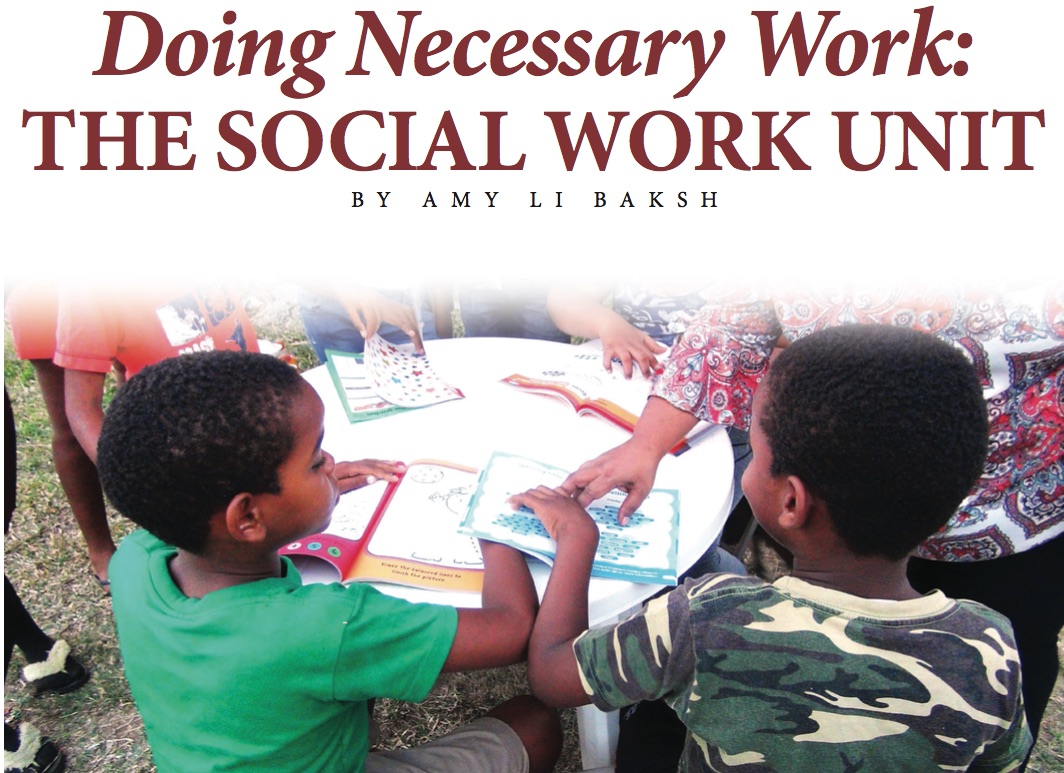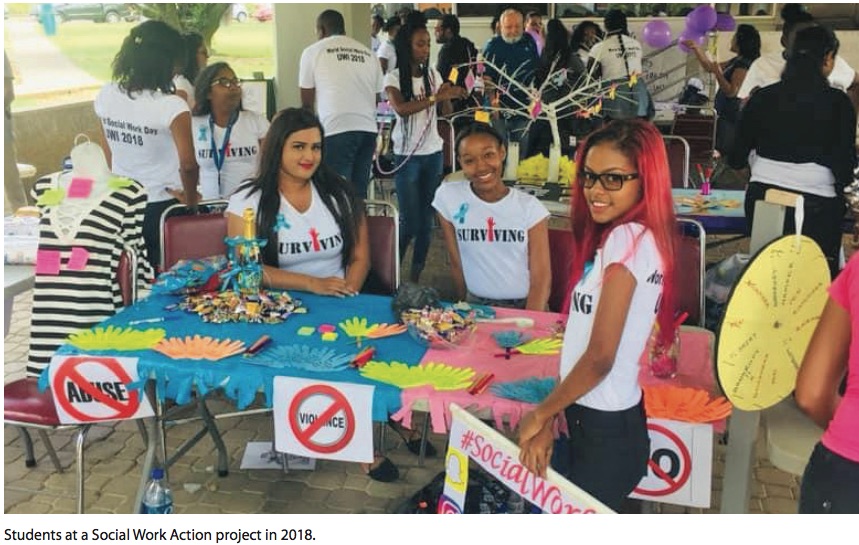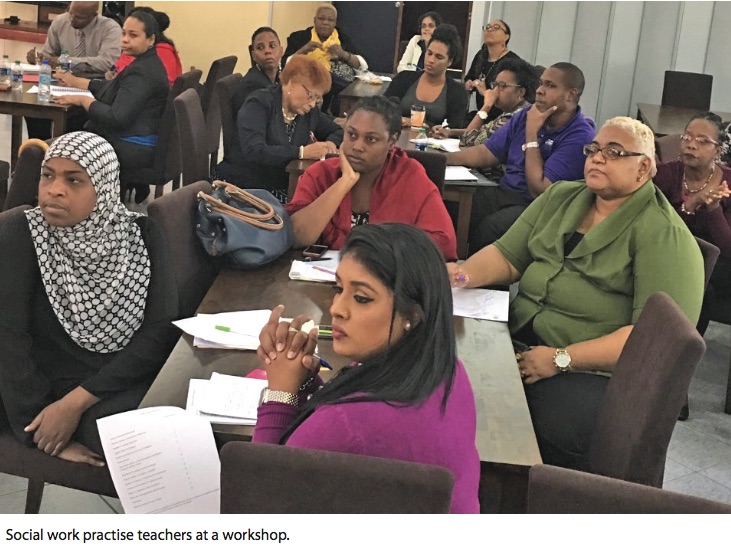
There’s no denying that our society is in great need of organisations and people that are equipped to help meet the complex requirements of our different communities, and to improve their quality of life. Social work is a field that addresses the barriers to well-being that exist in society, promoting social change and development and the empowerment of people. This requires not only a passion for helping others and creating social change, but also a range of skills in understanding human behaviour and the workings of social and cultural institutions.
In Trinidad and Tobago, the field of social work has come a long way since the establishment of social work training in the Caribbean as early as 1962, when the Social Welfare Training Centre opened its doors. Under the Department of Behavioural Sciences on the St Augustine Campus, “the programme began as a two-year Certificate in Social Work in 1990, established the BSc in 2000 and MSc in 2002-2003, and then the PhD. The Social Work Programme is committed to addressing the needs of communities in the country and the social work faculty actively engages in building relationships with communities.” says Dr Cheryl-Ann Boodram, Co-ordinator of the Social Work programme.
“We’ve really come into our own as an academic discipline,” she adds. “The mission of the Social Work Programme is to improve the condition of Caribbean people through the provision of teaching, research and outreach activities of exceptional quality.”
According to Dr Karene Nathaniel-DeCaires, a lecturer in the programme, one of the highlights is the high level of practical work required by students: “The well-structured field practicum is the hallmark of social work education at The UWI St Augustine, giving students the opportunity to engage actively with practicing social workers and clients in social service agencies.”
By performing the roles of social workers in government agencies, non-governmental organisations and community-based organisations, students learn valuable lived experience while also providing human resources for these organisations to pursue projects that may have otherwise been out of reach.
“We have high levels of community engagement,” says Dr Boodram. “Our students, the Social Work Unit, spearheaded the collaborative Farm Road project.”

This social innovation project for the Farm Road, St Joseph community was launched in 2017, and is still ongoing to improve education, health and social well-being in this underserved community of more than 900 residents. A joint initiative between the Careers, Co-curricular and Community Engagement Department of the Division of Student Services and Development and UWI’s Social Work Unit, the project has set up homework centres, vacation camps, parenting programmes, and is now assisting with COVID-19 pandemic support for families.
The global pandemic has compounded social issues, especially for vulnerable communities. This created a new challenge for the Social Work Unit. They had to find solutions while also functioning virtually and adapting to social-distancing measures.
As Dr Nathaniel-DeCaires notes, “The need for social work engagement and intervention is incredibly high. With children out of school, the risk of child abuse and endangerment increases. Isolation, physical distancing and limited social and recreational outlets increase the risk of mental health decline, and the digital divide compromises academic achievement. With high unemployment and under-employment, socio-economic factors can exacerbate other issues.”
Despite the overwhelming need for social support, social workers are essential workers, and must be recognised for their work with at-risk groups of people who have experienced greater vulnerabilities due to the pandemic. Dr Camille Huggins also believes that “social workers must be prepared to work with clients utilising trauma and grief-focused approaches, because of the trauma they may have experienced due to COVID-19”.
“Social workers have traditionally worked in resource-strapped settings,” says Dr Nathaniel-DeCaires. “I believe many are innovating, doing the best they can with what they have, and trying to respond where there is greatest need. While social workers are essential, the breadth of work created by the pandemic overwhelms the capacity of professionals to respond efficiently. This situation presents an opportunity for macro-practice approaches – robust inter-agency exchange and collaboration, community engagement and development, structural strengthening and social work advocacy in the interest of social justice.”
Within the programme itself, the last year has been rife with unexpected changes that have required quick reaction times to circumvent. “Over the past year, social work practicum students have provided virtual support for families,” says Dr Boodram.
As a result of COVID-19 restrictions, students were required to conduct needs assessments for particular groups in society and identify those experiencing steepened vulnerabilities due to the pandemic. They then engaged in virtual practicum projects which focused on supporting an identified vulnerable population during the restrictions and lockdown. The students hosted webinars to support groups such as the elderly and parents managing their children’s online school education. Online resources were created for the children themselves to assist in learning as well as maintaining their mental health.
“Social Work Unit staff also engaged with social work agencies to develop their capacity to successfully transition practice delivery online or via tele-social work practice, and the general public to understand the psycho-social impact of COVID-19 on their physical and mental health,” says Dr Boodram.

This practical approach has left an impact not only on the communities served, but also the students who will become the future of social work. One such graduate, Tya Jane Ramey, who was also Trinidad and Tobago’s representative at the 2019 Miss World competition, remembers her time in the field as the highlight of the programme:
“If I had to choose the highlight of my time there, it would be as a student practitioner working with agencies such as the Children’s Authority and Children Court. There we served children in vulnerable circumstances.”
Ramey, who entered the Social Work Programme in 2016, says, “The three years [of the programme] managed to exceed my expectations; shaping my understanding of social injustice and its interaction on all levels of society, transforming my proclivity to help into skills to become a professional change agent, and providing guided exposure to social issues and social service institutions.”
After graduating, and through the Miss World Beauty with a Purpose Project, she was able to create Project Esperanza. “As the social climate in 2019 was drenched with the concerns surrounding the high influx of Venezuelan migrants in our country, I decided that my project would address the xenophobia surrounding displacement, and to work directly with Venezuelan migrant children. I could not have advocated and gone on a nationwide media campaign of sensitisation, brokered child-friendly spaces with resources, or engaged in group intervention without the framework social work taught me.”
As the Social Work programme continues to expand and change with the unstable nature of our daily lives under the global pandemic and the social and economic issues that surround it, the team hopes to continue training new generations of social workers who are passionate about changing the world.
“It’s a beautiful profession that requires continuous learning and reflective practice,” says Ramey, who considers the reward of working in the field to be reflected best in “testimonies of restoration”.
And with an uncharted frontier ahead of us, it is more vital than ever that we invest in healing and bettering our society – especially the communities that have been overlooked in the past and who are now facing a wide range of crises that can only be solved when we work together.